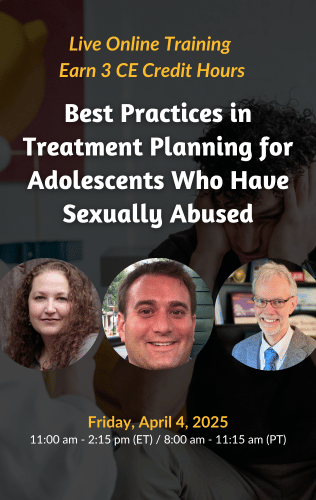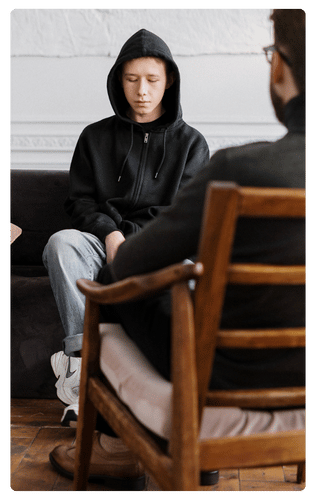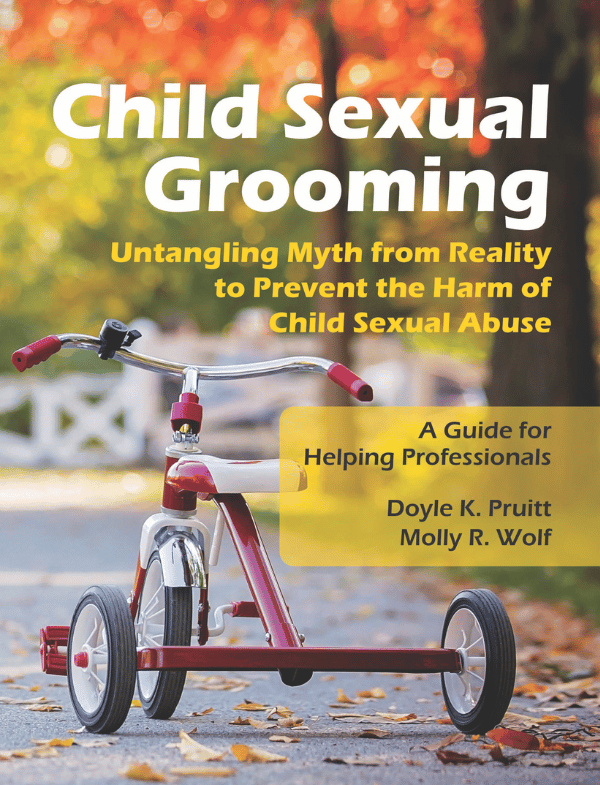Home / Shop / Online Trainings / Trainings
Live Online Training - Best Practices in Treatment Planning for Adolescents Who Have Sexually Abused

- Description
Date: April 4, 2025
Time: 11:00 am – 2:15 pm ET /
8:00 am – 11:15 am PT
Format: Live interactive training offered via Zoom
Presented by: Katie Gotch, LPC, CCSOT, ATSA-F (See Bio), Seth Wescott, LMLP, ATSA-F (See Bio), and David Prescott, LICSW, ATSA-F (See Bio)
You must attend the entire live training and complete an evaluation to be eligible for CE credits. If you seek only psychology credits, the evaluation is optional, and you can remain anonymous.
Online Training Description:
The code of ethics of every mental health profession emphasizes the importance of treatment planning in ensuring successful outcomes. However, for professionals who treat people who have harmed others, training on the process of treatment planning has been minimal, resulting in practitioners entering the profession with unanswered questions.

For example, what is the best way to customize treatment when using empirically supported approaches?
How can practitioners best integrate knowledge of the adolescent’s psychosocial development?
What do practitioners need to know about the context of the adolescent’s behaviors?
What are the common pitfalls in understanding youths who have harmed?
This training brings together three experts to provide over-arching guidance and practical tips for establishing treatment plans that lead to successful outcomes for the adolescents and their families. The presenters discuss common challenges that can occur in treatment programs and offer insights on navigating complex scenarios.
This training examines treatment planning from many angles, including:
- The importance of using approach goals rather than avoidance goals
- Differentiating goals and objectives
- The therapeutic alliance
- Risk/needs assessments and their relationship to treatment planning
- The effects of trauma and adversity
- The impact of race and culture
- What is known (and not known) about the effects of treatment dosage
- Risk factors as barriers to achieving “good life goals”
- Working in collaboration with larger systems, such as criminal justice and child welfare agencies
- Treatment planning for clients who deny their behaviors
The presenters aim to equip professionals with the tools to develop individualized treatment plans that address the unique needs and risks of adolescents who have harmed others, ultimately enhancing the effectiveness of their interventions.
As a result of this training, participants will be able to:
1) Explain the role of treatment planning in interventions with adolescents who have harmed others.
2) Describe how understanding both risk and needs can inform adolescents’ treatment plans.
3) Create treatment plans for adolescents using approach goals.
4) Recognize how trauma and adversity create treatment needs that can be addressed in treatment, whether through trauma treatment or trauma-informed care.
Interactive Follow-Up Meeting
Attendees are invited to join an open discussion 15 minutes following the end of the training, where you can engage with fellow attendees by turning on your camera and microphone. This is an opportunity to share your experiences and contribute to a meaningful exchange of ideas. Time will be allocated to address questions or insights from the training. Please note that attendance is optional and will not affect your eligibility for a training certificate.
We can refund your training fee up to 24 hours prior to the start of the training.
To view all training details and review our list of frequently asked questions, please click here to visit the promotional page.




